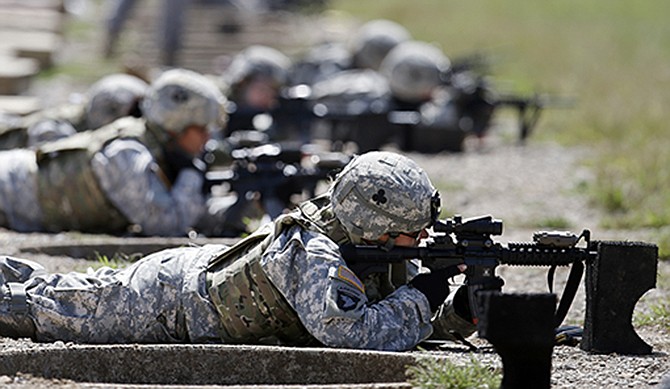FORT EUSTIS, Va. (AP) - Only a small fraction of Army women say they'd like to move into one of the newly opening combat jobs, but those few who do, say they want a job that takes them right into the heart of battle, according to preliminary results from a survey of the service's nearly 170,000 women.
That survey and others across the Army, publicly disclosed for the first time to The Associated Press, also revealed that soldiers of both genders are nervous about women entering combat jobs but say they are determined to do it fairly. Men are worried about losing their jobs to women; women are worried they will be seen as getting jobs because of their gender and not their qualifications. Both are emphatic that the Army must not lower standards to accommodate women.
Less than 8 percent of Army women who responded to the survey said they wanted a combat job. Of those, an overwhelming number said they'd like to be a Night Stalker - a member of the elite special operations helicopter crews who perhaps are best known for flying the Navy SEALS into Osama bin Laden's compound in 2011.
Last year top Pentagon officials signed an order saying women must have the same opportunities as men in combat jobs and the services have been devising updated physical standards, training, education and other programs for thousands of jobs they must open Jan. 1, 2016. The services must open as many jobs to women as possible; if they decide to keep some closed, they must explain why.
The Army says that about 200,000 of its 1.1 million jobs are either direct combat or related jobs such as field artillery, combat engineers and so on. That's roughly 20 percent of the force, though the direct-combat front-line fighters make up roughly half of that or about 9 percent.
Throughout last year, the Army emailed questionnaires to active duty, reserves and Army National Guard members to gauge soldiers' views on the move to bring women into combat jobs. The results from the survey sent to women showed that just 2,238 - or 7.5 percent - of the 30,000 who responded said they would want one of the infantry, armor, artillery and combat engineer jobs.
Army officials also polled men and women on their concerns about the integration. And they asked senior female leaders to say whether they would have chosen combat jobs if they'd been given that chance 10 or 20 years ago.
All agreed the physical standards for the jobs should remain the same.
"The men don't want to lower the standards because they see that as a perceived risk to their team," David Brinkley, deputy chief of staff for operations at the Army's Training and Doctrine Command, told the AP. "The women don't want to lower the standards because they want the men to know they're just as able as they are to do the same task."
Brinkley's office at Fort Eustis is filled with charts, graphs and data the Army is using to methodically bring women into jobs that have been previously open only to men. The surveys are helping to shape the education and preparation that women, men and top leaders need to put in place to insure the integration goes smoothly.
The questionnaires, and the focus groups that followed them, showed that younger men and those who have served with women in the last two years are more open to the integration, while mid-level soldiers - particularly those in units such as infantry and armor that have not yet included women - were more hesitant.
And there were nagging stereotypes. Male soldiers fretted that their unit's readiness will be degraded because of what they term "women issues," such as pregnancy and menstrual cycles. Or they worried that women incapable of the physical demands would be brought in anyway.
Officers were concerned about sexual harassment and improper relationships. And the idea of integrated units bothered both military wives and husbands.
Army leaders were unsurprised by the small number of women interested in combat jobs.
According to the survey, the vast majority of the women who expressed interest in combat jobs were in the lower ranks, age 27 or younger.
Some of the more experienced soldiers said that if they had it to do all over again, they might choose one of the combat arms jobs.
The limited interest also is in line with what other countries, such as Norway, have seen as they integrated women into combat roles, Brinkley said.
But, what surprised even him was what the women named as their preferred combat career.
More than 30 percent of the survey respondents pointed to the 160th Special Operations Aviation Regiment.
The 160th is a specialized unit used to fly forces fast, low and deep behind enemy lines under cover of darkness. Seventeen women already work in the unit in administrative, intelligence and logistics posts. And there have long been women aviators and aircrew in the conventional Army, just not on the special operations teams.
The second most popular choice was infantry, followed closely by combat engineers. Far fewer said they wanted to be in the field artillery, where unit members move and work with massive rocket and cannon systems. And the least popular branch of the Army they named was armor - jobs that involve working in the hulking tanks and armored vehicles.

